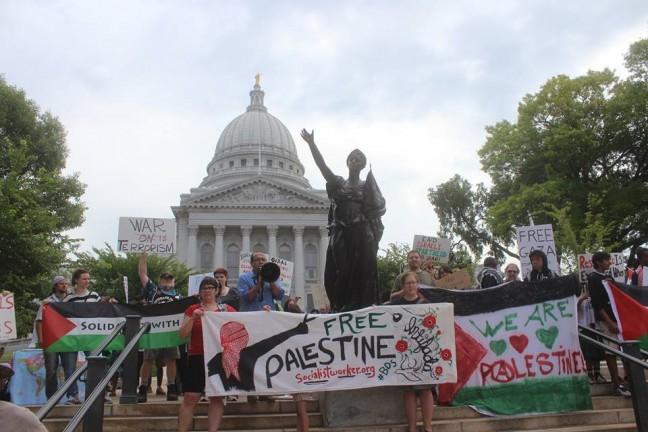“Anti-Semitic.” “Hateful.” “Divisive.” “Disgusting.”
These were all words I heard as descriptions for the Associated Students of Madison resolution targeting companies that profit off the oppression of black and brown bodies. Over and over again, I’ve heard how this resolution would divide our campus, how it would bring about hatred and how it would particularly “ruin job prospects for business students.”
I could not help but notice the perpetual hypocrisy and cognitive dissonance exhibited by critiques of the resolution.
How each person who had a qualm with the resolution’s critique of Israeli companies had no words for the companies that profited off free labor from black men in our prisons. How no one who thought the bill was “hateful” addressed the hateful and brutal treatment of our Latin and indigenous brothers and sisters who face oppression at the hands of companies building a wall on the U.S.-Mexico border to the Dakota Access Pipeline. How few people who described Israel as a beacon of light and a democracy addressed the very true and real dehumanization of Palestine people by the Israeli government. Time and time again, these narratives ignored the marginalized communities.
Students for Justice in Palestine speaker on postponed divestment proposal: ‘Vote yes’
I, as an ally to my Palestinian brothers and sisters, should not be labeled as an anti-Semite for challenging the policies in place that demonize Palestinians each and every day. What about acknowledging and condemning police brutality, restrictions on mobility, building of illegal settlements and countless other human rights violations in Israel makes me an “anti-Semite?” Am I hateful for condemning the treatment of Palestinian children in the Israeli court system? It is alarming that any critique or voice opposition against cruel policies is faced with erasure and silencing.
As a black woman, empty messages of solidarity with the black community to justify arguments echoed across the room repeatedly. The hypocrisy of those who cheered and clapped when speakers hollowly chanted “Black Lives Matter” after ignoring the oppression of black bodies in the resolution was blinding. Individuals lectured a black council member on how Israel “invented the Black Lives Matter movement” when the systematic oppression of Ethiopian black Jews through police brutality and forced sterilization of women is well-documented.
As a minority student on this campus, I have seen this divisiveness play a role in every situation that arises when marginalized students voice their concerns. When students marched on campus after the police-involved shootings of Mike Brown and Eric Garner, other students opposed it, saying “Black Lives Matter” was hateful and divisive to our campus and to white students.
ASM indefinitely postpones divestment resolution after hours of heated debate
While I agree with the sentiment that hostility will not be the solution to these polarized problems, I am quite fed up with the hollow cries of “dialogue” and “discussion.” When our well-being and life is not valued on a basic level, no amount of dialogue or coffee discussions will fix the problem at hand.
When a speaker could not even utter the name “Palestine” and essentially erased the narrative and experiences of my Palestinian brothers and sisters, what form of dialogue will move that situation forward?
Black and brown communities constantly have to play safe when addressing issues pertaining to their own well-being and survival. My Palestinian brothers and sisters can’t critique the very government that treats them like second-class citizens without being labeled as an “anti-Semite.” My black brothers and sisters can’t chant “black lives matter” without being labeled as radical or divisive. My indigenous brothers and sisters are often left out of the narrative entirely and met with the same labels of “divisiveness.”
Time and time again, our oppression is left on the back burner for being too divisive, too controversial and too much of a burden to handle at the current political time. We are constantly told now is not the time, this is not the appropriate place, this is not the appropriate strategy.
Naman Siad ([email protected]) is a graduate student at the University of Wisconsin law school. She also sits on ASM.














